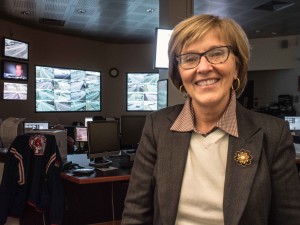
Gaby Abbate, Chief of the Office of Highway Safety at the RI Department of Transportation
Tell us about the Office on Highway Safety at the Rhode Island Department of Transportation (RIDOT). What are the responsibilities associated with your office?
Our goal at the Office of Highway Safety (OHS) is to save lives and prevent serious injuries by reducing the number of traffic crashes in the state. We take a global approach to prevention and safety by focusing on environmental strategies to influence roadway behavior. We implement media campaigns, review State and municipal policy and public ordinances, support education and curriculum development, and organize outreach efforts across the state. We are data driven, allowing us to target specific behaviors with directed programs. We target risky behaviors like speeding and impaired driving, and the groups that are identified as risk-takers.
Roadway use is one of the most common denominators for every family and visitor in this state. Everyone uses the roads, whether we drive, walk, or bicycle. As a result, our office approaches roadway safety from many different perspectives—including the vehicle driver, the vehicle passenger, pedestrians, young drivers, seniors crossing the road, and infants being driven home from the hospital for the first time.
We are the only entity within the Department of Transportation that is completely funded by the National Highway Traffic Safety Administration (NHTSA).
Let’s talk about impaired driving in Rhode Island. What are you seeing?
One third of all fatal crashes in Rhode Island are related to impairment. For a long time, our demographic data identified 18 to 35 year old males as the group we needed to focus our prevention efforts on. Recently those identifiers have shifted to include an older demographic—26 to 50 year old males—so we are correspondingly shifting our target and strategies.
What is the Rhode Island Department of Transportation doing to prevent impaired driving?
In line with the new data trends, we are implementing some new programs for adults. We are developing an initiative for local businesses which includes educational sessions focused on impaired driving. We are calling them ‘Lunch & Learn’ sessions. Colonel Steven O’Donnell, Superintendent of RI’s State Police will deliver both an enforcement message and a safety message. We’ve found that you have to meet people where they are. It is difficult to reach people at night for a meeting when there is so much else going on in their lives.
We have also recently created a task force called the Impaired Driving Prevention Alliance. Three State Troopers have been assigned to the Office on Highway Safety to support the Department’s impaired driving goals and strategies previously approved by NHTSA. They will work in a coalition model to promote policy, media, and programs to eliminate impaired driving in our state.
The OHS provided funds and support to allow the City of Providence to purchase a mobile command center to help with municipal and state law enforcement’s DUI patrols. Providence offered to be the central repository for the command center and bring it into any RI community to help with their efforts as well.
We are also implementing a new crime and traffic safety initiative called Data Driven Approaches to Crime and Traffic Safety (DDACTS). It allows us to overlay crime and crash data on a map in order to determine where to deploy police. As we are a small state with limited funds, it is very important that we are data driven and allocated our resources appropriately.
RI DOT’s new Director, Peter Alviti, Jr is in complete support of all our safety efforts, whether they are structural or behavioral. The director has fostered a strong relationship with Colonel O’Donnell and Department of Health Director Alexander-Scott in order to demonstrate the department’s belief in partnerships and leadership.
What role do the DOT Community and State Stakeholders play in prevention? Who is represented within this workgroup?
Partnerships are very important to our work. It’s the only way we can make all the dots connect and stretch our funding dollars. Our NHTSA funding allows us to award grants to our partners in the community. Any non-profit, state agency, or municipal agency is allowed to apply for these funds as long as their proposal is focused on roadway safety, has tangible deliverables, and includes appropriate evaluation, outcome, and performance measures. In the past we have supported media campaigns, law enforcement details, and community activism. We convene the stakeholder group so that our grantees and other stakeholders can meet and work together.
Are there any prevention strategies you would recommend to community prevention coalitions?
Environmental strategies are key. Towns and cities would also benefit from looking at their ordinances to make sure they are incentivizing the right behavior. Allowing town employees time to be educated around these issues would also be helpful.
Ultimately, it starts in the family unit. It’s not just the responsibility of the state. Parents need to educate their children on safe roadway behavior, whether they are driving, riding, or walking. Parents need to model safe roadway behavior. Community coalitions can help facilitate that through education and media messaging.

